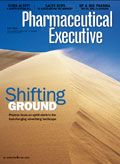BP and Big Pharma: A Warning Sign
Pharmaceutical Executive
If there was ever a justification for endorsing a "triple bottom line" strategy for measuring Big Pharma's investment performance, it's the BP crisis.
As our lead feature this month points out, the media continues to shape the choices we make as consumers in the marketplace.

William Looney
Reputation counts. This is why no pharma company can ignore what confronts BP in its mission to restore the blowout in the Gulf. Surface analogies are apparent: Both oil and pharma require huge investments—drilling a lot of dry holes just to find one gusher.
But let's examine the implications below the surface. Medicine, like oil, is a high-demand necessity. Government intervention is the sine qua non for both sectors' existence. But there is a big difference: While oil fuels our cars, pharma improves, and even saves, lives.
If there was ever a justification for endorsing a "triple bottom line" strategy for measuring Big Pharma's investment performance, it's the BP crisis. The welfare of millions of patients depends on having accountability, trust, and reputation at the top of each CEO's agenda. Following are some warning signs that, if left unaddressed, could lead to a similar assault on pharma's reputation.
Neglect of safety and risk factors associated with real-world patient use of medicines Sometimes the industry fails to observe the edict that even the best medicines are dangerous. There are human consequences when mandatory adverse event reports are poorly tracked: stuffed in closets instead of being properly documented.
Pricing practices that test legal boundaries against high-profile payersPharm Exec's feature interview last month with Lewis Morris, chief counsel of the HHS Office of Inspector General, indicates that patience is wearing thin with a strategy of paying fines against what amounts to a few days of company revenue flow. According to Morris, companies may soon be facing a ban on doing business with government, effectively denying them that crucial license to operate.
Fissures in the global supply chain As the complexity of biologics and other new compounds increase and manufacturing moves offshore, the danger of a major safety "blowout" looms large. The questions that have plagued BP must be answered preemptively by pharma: Is my risk mitigation technology cutting edge? Are standards consistent across geographies? Is there a "safety first" mandate embedded as part of business culture?
Ethical gaps in the conduct of clinical trials Such trials are the guard post for the process of certifying a drug candidate as safe and efficacious for human use. But a growing percentage of such trials are being conducted outside the US, sometimes in countries where standards are lax and patients' interests are not protected. Pew Health program research we cited last month posed the question: Are cost savings from such trials worth a public health problem through a potential lower burden of proof in verifying trial results or abusing the rights of patients, leading to unanticipated deaths or disability?
Defensive litigation in opposition to patient product liability claims What business advocates call the "shakedown" of BP should serve as an eye-opener for pharma. The decline in public trust for corporations is creating new pathways for an activist government to regulate the financial burden in addressing the "victim syndrome." In other words, aggressive litigation to contest patient claims against defective products may no longer be a feasible option for the industry, at least in terms of what is politically tolerable.
The unkindest cut against the industry is embedded in a single, stark statistic: the 200,00 US patients who die each year from inappropriate or unsafe drug interactions. Collective responsibility aside, in the "gotcha" climate now looming as a consequence of the BP spill, pharma has to fear any event that will make that tough number the defining one.
William Looney
Editor-in-chief

FDA Outlines Updated Requirement for Placebo-Controlled Trials in Vaccine Research
May 21st 2025In an article recently published by The New England Journal of Medicine, FDA higher-ups Vinay Prasad, MD, MPH; and Martin A. Makary, MD, MPH, wrote that any new COVID-19 vaccine must now be evaluated in placebo-controlled studies.
Addressing Disparities in Psoriasis Trials: Takeda's Strategies for Inclusivity in Clinical Research
April 14th 2025LaShell Robinson, Head of Global Feasibility and Trial Equity at Takeda, speaks about the company's strategies to engage patients in underrepresented populations in its phase III psoriasis trials.
Beyond the Prescription: Pharma's Role in Digital Health Conversations
April 1st 2025Join us for an insightful conversation with Jennifer Harakal, Head of Regulatory Affairs at Canopy Life Sciences, as we unpack the evolving intersection of social media and healthcare decisions. Discover how pharmaceutical companies can navigate regulatory challenges while meaningfully engaging with consumers in digital spaces. Jennifer shares expert strategies for responsible marketing, working with influencers, and creating educational content that bridges the gap between patients and healthcare providers. A must-listen for pharma marketers looking to build trust and compliance in today's social media landscape.